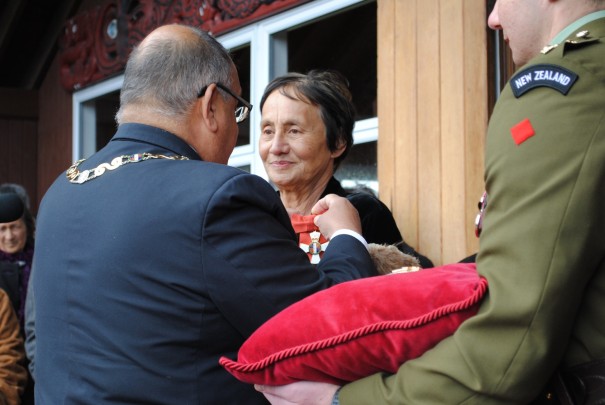Investiture of Dame Temuranga Batley-Jackson

For more images, please click here.
May I begin by greeting everyone in the languages of the realm of New Zealand, in English, Māori, Cook Island Māori, Niuean, Tokelauan and New Zealand Sign Language. Greetings, Kia Ora, Kia Orana, Fakalofa Lahi Atu, Taloha Ni and as it is the morning (Sign)
May I specifically greet you: Dame Temuranga Batley-Jackson and your whānau; Senior Maori leaders; Hon Justice Sir Taihakurei Durie and Donna Hall, Sir Harawira Gardiner, Pauline Kingi, Jim Mather, Selwyn Muru, Bentham Ohia, Sir Atawhai Taiaroa; Denis Hansen; Toby Curtis; Minister of the Crown, Hon Georgina te Heuheu, Minister Courts, Minister of Disarmament and Arms Control and Minister of Pacific Island Affairs; Members of Parliament (past and present): Hon Parekura Horomia, Hon Shane Jones; Hone Harawira; Ross Robertson, Su’a William Sio, Hon John Tamihere; Your Worship Len Brown, Mayor of Manukau; Your Worship John Banks, Mayor of Auckland; Present and former members of the Parole Board, Sir David Carruthers, Sir Thomas Thorp, Alan Ritchie; Your Honour, Acting Chief District Court Judge Jan Doogue, and fellow current and former members of the judiciary ;Your Honours Judges Russell Callander, Mike Crosbie, Pat Toomey; Sir Patrick Mahoney, Carolyn Henwood; Avinash Deobahkta and Bernard Kendall; Current and former Corrections Officials, Mark Byers, Tim Bannatyne, Barry Matthews; Archbishop Brown Turei; Distinguished guests otherwise; Ladies and Gentlemen, Boys and Girls.
As Governor-General I have the authority and privilege on behalf of Her Majesty The Queen to hold this ceremony to present the insignia of a Dame Companion of The New Zealand Order of Merit to Dame Temuranga Batley-Jackson, for services to Māori.
Just before doing so, I would like to take the opportunity to talk about the significance of this venue, Nga Whare Waatea Marae, and the service it provides to the people of Manukau.
Before the Second World War, more than 80% of Māori were living in rural areas, primarily within tribal districts. Then came what has come to be described as the ‘urban migration’. Availability of work in rural areas slowed and employment prospects for young Māori in urban areas increased aided by post-war economic growth.
During the 1960s, Māori families began to migrate in even more significant numbers, particularly to Auckland, Wellington, and Hamilton. Many Māori having planted their roots in the cities still needed a tūrangawaewae—a place to stand and express cultural identity.
The migration also meant that many Māori lost a number of their connections with iwi and hapu over time. This was a cause of social dislocation and was accentuated by the Second World War where the 28 (Māori) Battalion, suffered significant casualties and many future Māori leaders of that generation were lost.
The beginnings of urban marae, such as Nga Whare Waatea, began in the 1960s. Established to serve as a traditional marae, they have since become an integral part of contemporary Māori life enabling Māori to maintain connection with their culture and community.
Nga Whare Waatea marae is a fine example of a place that holds great significance for the people of Mangere and Manukau City. It serves as a pan-tribal marae, and is open for all members of the wider Manukau community to use. Nga Whare Waatea serves as a foundation base for a variety of services, including driver licence training, a Tikanga Māori programme, a restorative justice programme, and a He Ara Tika Mentoring Programme.
Additionally, it is the location where Radio Waatea 603AM is based and the base of a variety of services and activities delivered by the Manukau Urban Māori Authority, of which Dame Temuranga was founding Chief Executive Officer.
It therefore seems fitting that this investiture ceremony takes place on the Nga Whare Waatea marae – a place to which Dame Temuranga is intrinsically linked.
I will now read the citation, which outlines Dame Temuranga’s significant service to Māori:
Dame Temuranga was appointed as a Commissioner for the Treaty of Waitangi Fisheries Commission in 2004. She was instrumental in taking legal action to the Privy Council in 1996 on behalf of urban Māori, to negotiate a fairer share of the Crown's fisheries settlement. She was Chairperson of the Putea Trust Board, created by the Fisheries Commission to respond to urban Māori concerns. She is Chairperson of Whakatipu Trust, of Family Start Manukau, and of Te Kupenga o Hoturoa Primary Health Organisation. She has extensive experience in developing models of self-sufficiency, establishing small business initiatives and working with families. She has been particularly successful in improving job training, access to small business loans and social services within Māori communities. Dame Temuranga was Chief Executive Officer of the Manukau Urban Māori Authority for 19 years, until her retirement in 2009. Among many initiatives, the Authority operates a highly regarded residential reintegration programme for newly released prisoners. She was appointed to the New Zealand Parole Board in 1986 and is its longest-serving member, having served for 19 years. She has served on several government-appointed committees, including the Review of Māori Trust Boards in 1994 and the Prime Ministerial Task Force on Employment Policy in 1993. In 2006, she featured in the documentary Mana Wahine, and a book, Mana Wahine: Women Who Show The Way. Dame Temuranga counsels South Auckland Māori whānau on a weekly basis at Nga Whare Waatea marae.
And so, just before I formally confer this honour, I will close in New Zealand’s first language, issuing greetings and wishing everyone good health and fortitude in your endeavors. No reira, tēnā koutou, tēnā koutou, kia ora, kia kaha, tēnā koutou katoa.
I now summon Dame Temuranga Batley-Jackson to come forward and receive the Insignia of a Dame Companion of the New Zealand Order of Merit.
